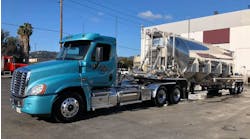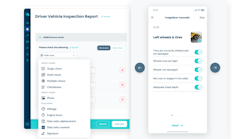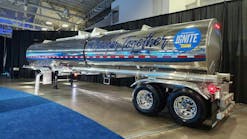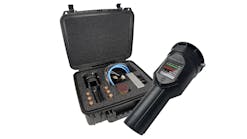In August 2004, Mike Siebert climbed into a truck cab for a demonstration of Meritor WABCO's Roll Stability Control (RSC) system, and 15 minutes later, came away a believer.
“I got out of the truck, grabbed my cell phone, and called my Freightliner salesman,” said Siebert, director of maintenance for Apex Logistics in Adelanto CA. “I was so impressed with the way the system performed. He quoted me a price in the $250 range, and we've ordered it on every tractor since.”
Currently, 75% of the company's 250 tractors are equipped with RSC, part of Meritor WABCO's SmartTrac family of stability products. The percentage grows with each new power unit that Apex adds to its fleet. “It's a standard policy: we won't spec a tractor without it,” Siebert says.
Apex, a leading bulk carrier in the western United States and Canada, hauls non-hazardous commodities as varied as its customer base, including liquid and dry chemicals and all types of construction materials.
The operating conditions are challenging, with steep grades, combination trailers, and high-center-of-gravity loads. “We averaged three rollovers a year until Jan 1, 2005, when we started equipping our tractors with RSC,” Siebert said. “We haven't had a rollover since.”
Introduced in North America by Meritor WABCO, RSC is a factory-installed electronic stability control system for Class 8 tractors. It uses the same electronic controls as the Meritor WABCO antilock braking system (ABS) and continually monitors the vehicle's center of gravity, wheel speed, and lateral acceleration limit, or rollover threshold.
When RSC identifies a potential rollover, and there is no input from the driver, it produces a warning on the dash and automatically reduces engine torque, engages the engine retarder, and applies the drive axle and trailer brakes to slow the vehicle.
This sequence of monitoring, intervention, and warning can give the driver the split-second he needs to maintain control the vehicle. “RSC is always on. We don't have to teach drivers how to use the system,” Siebert said. “Instead, we can focus our training on what causes rollovers and how to anticipate those conditions.”
RSC integrates with mobile communications systems, giving Siebert and his management team the advantage of monitoring hard braking and RSC applications while the truck is on the road. He says RSC extends the value of the company's mobile communications investment and gives managers better visibility into vehicle and driver performance.
“When there's hard braking or a potential rollover situation, the Qualcomm system records the event electronically and sends an alert to our managers' Blackberries or desktop computers,” Siebert said. Managers can respond to unsafe driving behaviors right away and then use vehicle-location reports and sensor data during training.
“We can plot critical events on a map and say, ‘This offramp is a potential trouble spot.’ It's a great tool for managers and drivers alike,” Siebert said.
For Siebert, RSC is an affordable technology that quickly delivered a return on the investment. He says RSC, combined with a concentrated driver training effort, produced a 50% reduction in worker comp, physical damage, and liability insurance at Apex.








